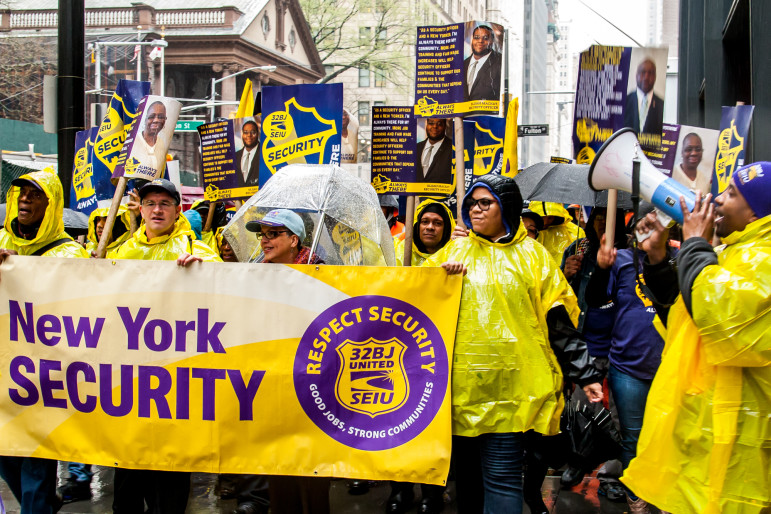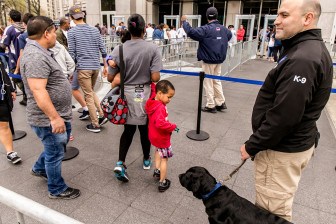
Adi Talwar
32BJ members at a rally early in the contract dispute. The union’s presence in the industry is small but growing.
* * *
UPDATE May 19: According to a statement from 32BJ, “On May 12, the union reached a tentative agreement with the contractors, averting possible strikes throughout the city. … The tentative contractors agreement reached on May 12 gives security officers a wage increases that will create a minimum wage of $15.50 by 2019. … Security officers will also see the number of paid days off they are entitled to rise from 3 up to 7, not including vacation. Security officers are expected to ratify the contract in a private meeting on May 25.
* * *
Although contract negotiations between Local 32BJ’s Security Division and the employers bargaining committee have still not been settled, representatives of the union are encouraged that they will come to an agreement that best fits their member’s needs and will help continue their growth.
Since February 32BJ has been fighting for a new contract, which will not only ensure job security, but will increase wages and expand healthcare benefits for thousands of security officers in New York City. On April 25, a tentative security agreement was reached with the Realty Advisory Board, representing major building owners and property services contractors. However the employers bargaining committee, which is made up of security agencies like Allied Barton, Securitas, Summit Security and several others have not been able to agree on the increased wages and affordable health insurance options for their employees.
If 32BJ and the employers fail to come to an agreement, union members may strike, which would affect some of the city’s office buildings, museums, libraries, and important landmarks like the 9/11 memorial and One World Trade Center.
“Right now we have to show our strength and fight for our members. Nobody wants to strike, but the work our officers do is important to the safety of the people of this city and it’s the employer’s responsibility to recognize the safety that security officers provide by giving us a new contract,” said Denis Johnston, 32BJ Vice President and Security Division Director.
The negotiations could prove to be a watershed moment for 32BJ’s growing Security Division, as some members feel that a new contract will show that their work is a vital component to the city.
“32BJ has grown so much, but we grow because of the work these men and women do, and that needs to be recognized by these employers. They can’t ignore the fact that these men and women keep this city safe 24/7 and 365 days a year. That’s why we are out here in this rain, because they have to prove to us that they recognize the work that we do, and a new contract is how they prove that,” said Leroy Abramson, 74, a security officer for Securitas at Morgan Stanley, and executive board and bargaining committee member for 32BJ during a march 4, rally in downtown Manhattan’s Financial District.
32BJ also recognized that as the union grows so does the need for more comprehensive training that will prepare security officers in crisis and emergency management, which since 9/11 has been a major concern for the city. If the contractors agree to pay into the unions training courses, it will not only better prepare security officers to do their jobs, but will also prevent guards from falling victim to training school scams that have plagued the industry for years. According to Johnston the contractors would have to pay up to $300 per officers to get their comprehensive training in full effect.
32BJ’s Security Division has grown by 5,000 members over the last 5-years representing a total of 12,000 security officers in New York City today.
On April 28, in Bryant Park the Security Division held a second rally and this time they were joined by 32BJ’s doormen, school and office cleaners, airport workers, as well as 32BJ President Hector Figueroa and a number elected city officials.
One city official that has shown strong support is New York City Comptroller Scott M. Stringer.
“These men and women protect our universities, offices, government buildings, and they protect our tourist attractions, and now it’s our turn to step up and protect them,” said Stringer. “32BJ security officers are New York City’s front line of defense and they deserve a contract that recognizes the critical nature of their work with a fair wage and strong benefits.”
Even with all the support and strength in numbers, the eleventh hour has come and gone, leaving a potential agreement looming. In spite that Johnston still maintains his belief that the Security Division is still in the best possible position to come out on top of negotiations.
“We have changed the nature of this industry and when we get this contract it will show that the efforts we made were worth it for all of our current and future members. Getting this new contract is only a part of what we hope to do for our members—hopefully the employers want to work with us,” said Johnston. “32BJ has gone from 1000 members to 12,000 members in ten years. We did that by standing together, and we will get this contract the same way.”
Several attempts were made to contact employers, but no response was received.
City Limits’ series on the security guard industry is supported by the Fund for Investigative Journalism.










2 thoughts on “Security Contract Talks Could Give Union a Foothold in Industry”
Just want to know if Securitas is union
Is Summit Security Services union?